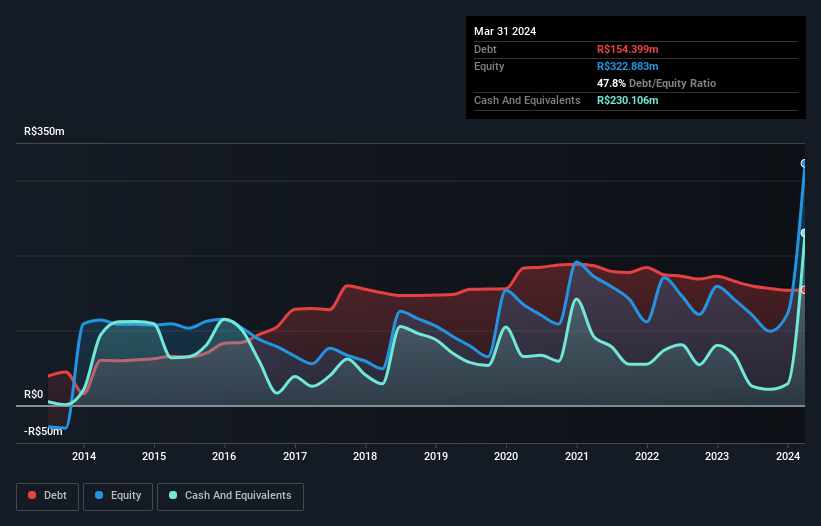David Iben put it well when he said, 'Volatility is not a risk we care about. What we care about is avoiding the permanent loss of capital.' So it seems the smart money knows that debt - which is usually involved in bankruptcies - is a very important factor, when you assess how risky a company is. We note that Biomm S.A. (BVMF:BIOM3) does have debt on its balance sheet. But the more important question is: how much risk is that debt creating?
When Is Debt Dangerous?
Debt and other liabilities become risky for a business when it cannot easily fulfill those obligations, either with free cash flow or by raising capital at an attractive price. In the worst case scenario, a company can go bankrupt if it cannot pay its creditors. However, a more frequent (but still costly) occurrence is where a company must issue shares at bargain-basement prices, permanently diluting shareholders, just to shore up its balance sheet. Of course, plenty of companies use debt to fund growth, without any negative consequences. The first step when considering a company's debt levels is to consider its cash and debt together.
See our latest analysis for Biomm
What Is Biomm's Debt?
As you can see below, Biomm had R$154.4m of debt at March 2024, down from R$165.6m a year prior. However, its balance sheet shows it holds R$230.1m in cash, so it actually has R$75.7m net cash.

How Healthy Is Biomm's Balance Sheet?
According to the last reported balance sheet, Biomm had liabilities of R$86.8m due within 12 months, and liabilities of R$131.7m due beyond 12 months. On the other hand, it had cash of R$230.1m and R$47.7m worth of receivables due within a year. So it can boast R$59.2m more liquid assets than total liabilities.
This surplus suggests that Biomm has a conservative balance sheet, and could probably eliminate its debt without much difficulty. Succinctly put, Biomm boasts net cash, so it's fair to say it does not have a heavy debt load! The balance sheet is clearly the area to focus on when you are analysing debt. But you can't view debt in total isolation; since Biomm will need earnings to service that debt. So when considering debt, it's definitely worth looking at the earnings trend. Click here for an interactive snapshot.
In the last year Biomm wasn't profitable at an EBIT level, but managed to grow its revenue by 7.6%, to R$122m. That rate of growth is a bit slow for our taste, but it takes all types to make a world.
So How Risky Is Biomm?
We have no doubt that loss making companies are, in general, riskier than profitable ones. And we do note that Biomm had an earnings before interest and tax (EBIT) loss, over the last year. And over the same period it saw negative free cash outflow of R$90m and booked a R$80m accounting loss. But at least it has R$75.7m on the balance sheet to spend on growth, near-term. Overall, its balance sheet doesn't seem overly risky, at the moment, but we're always cautious until we see the positive free cash flow. When analysing debt levels, the balance sheet is the obvious place to start. But ultimately, every company can contain risks that exist outside of the balance sheet. For instance, we've identified 3 warning signs for Biomm (2 are potentially serious) you should be aware of.
If, after all that, you're more interested in a fast growing company with a rock-solid balance sheet, then check out our list of net cash growth stocks without delay.
Valuation is complex, but we're here to simplify it.
Discover if Biomm might be undervalued or overvalued with our detailed analysis, featuring fair value estimates, potential risks, dividends, insider trades, and its financial condition.
Access Free AnalysisHave feedback on this article? Concerned about the content? Get in touch with us directly. Alternatively, email editorial-team (at) simplywallst.com.
This article by Simply Wall St is general in nature. We provide commentary based on historical data and analyst forecasts only using an unbiased methodology and our articles are not intended to be financial advice. It does not constitute a recommendation to buy or sell any stock, and does not take account of your objectives, or your financial situation. We aim to bring you long-term focused analysis driven by fundamental data. Note that our analysis may not factor in the latest price-sensitive company announcements or qualitative material. Simply Wall St has no position in any stocks mentioned.
About BOVESPA:BIOM3
Adequate balance sheet with low risk.
Market Insights
Community Narratives



